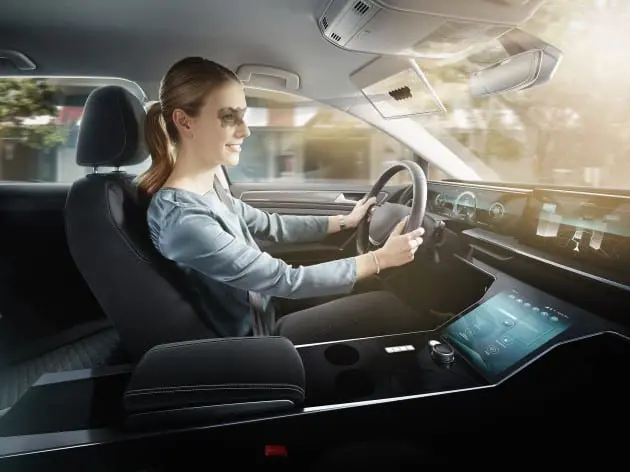Bosch wants to be an “innovation leader” in AI, it told CES last week. The German industrial giant, one of the manufacturing sector’s most outspoken champions of industrial 5G, is seeking to mainline data in its products and factories, and apply advanced analytics to drive efficiencies in its business and environmental impact.
By 2025, every product out of its 270 factories will either contain artificial intelligence or else have been developed or manufactured with the help of it, it declared. The message on industrial AI comes as the company prepares, again, to be among the more notable industrial outfits on the traditional tech circuit in 2020, taking in MWC in late February and Hannover Messe in late April.
Bosch set the tone for digital industry in 2019 with its visions about fold-away digital factories and modular assembly, threaded with wireless 5G. It closed 2019 by confirming its application for private 5G licences in Germany had gone to the regulator. It has kicked off 2020 with a clear statement of intent around the complementary role of AI in the industrial space.
Bosch has established a new AI training programme, with the intention of making 20,000-odd managers, engineers and developers “AI-savvy” over the next two years. “We must invest not only in artificial intelligence, but in human intelligence as well,” said Michael Bolle, board member at Bosch.
Bosch invests €3.7 billion per year in software development, it said. It currently employs around 30,000 software engineers, with 1,000 of them ‘working on AI.
The new programme includes guidelines for using AI responsibly. The company has drawn up its own set of “principles” for AI security and sovereignty, with a view to build trust with customers. “Trust is the [measure of] product quality of the digital world,” said Bolle.
The company said its interest in AI is to improve technology, only, and not to map human behaviour. People should always remain in control, it said, whether at home or in the factory. “Industrial AI has to be safe, robust, and explainable,” said Bolle.
Bosch has said it will invest €100 million in an AI research campus in Tübingen, in Germany, scheduled to open at the end of 2022 with 700 staff, including from external startups and research institutes, as well as from Bosch itself.
The new facility will slot into the Cyber Valley setup in Baden-Württemberg, in Germany. Cyber Valley was established in 2016 by ZF Friedrichshafen, Daimler, Porsche, BMW, and Facebook, alongside Bosch, as a joint research venture to bring together partners from industry, academia, and government to drive forward AI research.
The AI campus will work with seven other ‘Bosch centres for AI’ (BCAI), which includes two facilities in the US, where research and development of commercial AI techniques has been strongest. The US sites are in Sunnyvale and Pittsburgh. The BCAI venues employ around 250 data scientists in total; they focus on AI in mobility, manufacturing, and agriculture.
At CES earlier this month, Bosch showcased a number of AI-inspired products, notably for cars. It introduced new in-car video analytics systems. It has developed a digital sun visor (Virtual Visor; see image) with a transparent LCD display connected to an interior monitoring camera in the vehicle.
The camera detects the position of the driver’s eyes, and AI darkens the windshield in response, at the point where the sun dazzles the driver. The LCD also shows 3D driving alerts. And the camera is fixed to detect when the driver is drowsy or looks away from the road, based on their head position, and movement of their gaze and eyelids.
The system responds, apparently by assuming temporary charge of the visual inputs and alerting the driver in case of danger.
Bosch generated €2 billion of sales in 2019 from driver safety systems. AI will make them even safer, it said, bringing intelligence and responsiveness to assisted braking systems (ABS), electronic stability programmes (ESP), and airbag control units.
“In the future, when vehicles are in partially automated driving mode for sections of the journey such as on the freeway, the driver monitoring system will become an indispensable partner: In these situations, the camera will ensure that the driver can safely take the wheel again at any time,” the company said.
Bosch is looking to produce lidar sensors for car safety systems, to complement existing radar and camera based systems. “Lidar is the third essential sensor technology,” it said. Its new long-range lidar sensor can detect non-metallic objects at a great distance, such as rocks on the road, it reckons.
Meanwhile, Bosch has also deployed AI with its lunchbox-sized SoundSee sensor system, bound for space with NASA’s autonomous flying Astrobee robot, which launched at the end of 2019. The sensor is being used to analyse audio data, routed via ground control, to isolate unusual sounds, and indicate when maintenance is necessary.
It said, as well, that AI will play a key role in energy management platforms at its 400 sites across the globe – including all its 270 manufacturing plants – as they switch between energy sources, and the company looks to be carbon neutral by the end of this year (2020).
“We’ve already achieved this for our German locations,” said Bolle.
Bosch has raised more than €1.5 billion in revenue from the implementation of Industry 4.0 techniques in its own factories, as well as its customers’ factories, during the past four years, it reckons. The company has set an incremental revenue target of €1 billion per annum by 2022 from applying digital-change solutions inside and outside of its own factories.

